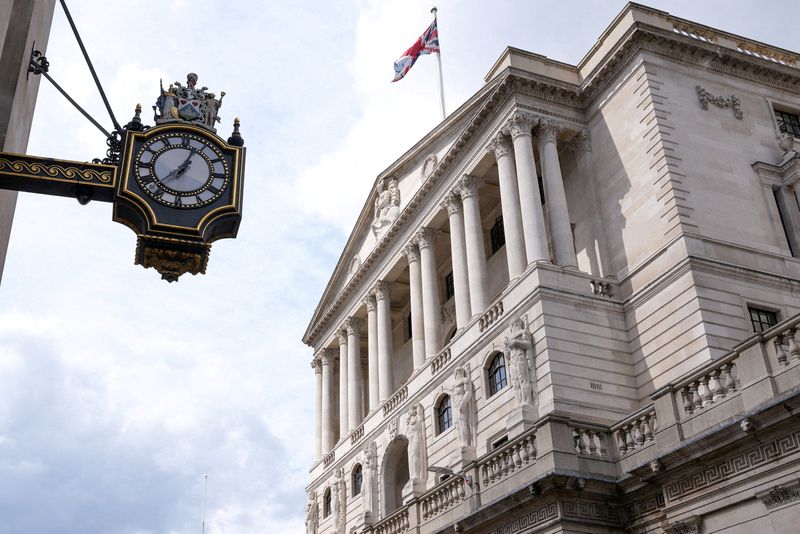By Andy Bruce
LONDON (Reuters) – British government bond prices recovered partially on Tuesday from the historic plunges of previous days when investors unloaded sterling assets at a ferocious pace in response to new finance minister Kwasi Kwarteng’s borrowing plans.
Britain sold 1.2 billion pounds ($1.3 billion) of an inflation-linked gilt due in 2031 with bids worth a healthy 2.30 times the amount on offer, but at a price: the real yield from the auction was the highest since November 2012.
This yield – the return investors will receive on top of the rate of retail price inflation, currently 12.3% – was 0.277%.
Short-dated conventional gilt yields, which move in the opposite direction to the price, were down around 25-27 basis points (bps) on the day as of 0926 GMT – only partially reversing rises of around 100 bps over the previous couple of trading sessions.
Late on Monday, the BoE said it would not hesitate to act to raise interest rates if needed to control inflation. Kwarteng said he would publish on Nov. 23 a medium-term debt reduction plan which had previously been intended for early 2023, alongside independent growth and borrowing forecasts from the Office for Budget Responsibility.
The swaps market now prices only a small chance of an emergency BoE rate hike in the coming weeks, in contrast to elevated expectations on Monday.
“The BoE would prefer to avoid emergency action, if possible, since it could be seen as panicky so soon after its regular MPC meeting only last Thursday, as well as a judgement on government policy so soon after the fiscal event last Friday,” economists at Italy’s UniCredit said.
In a further sign that sterling markets had stabilised for now, the pound rose by 1% against the U.S. dollar to just under $1.08.
Britain’s government bond market fell into free-fall after Kwarteng’s fiscal statement on Friday, which outlined a plan for economic growth funded by huge increases in government debt issuance – including an extra 62 billion pounds of gilts in the current financial year alone.
The five-year gilt yield was down 27 basis points on the day at 4.29% at 0929 GMT . In ordinary times that would count as a huge shift lower, but the yield is still up around 150 basis points in the month to date.
Such high volatility in the gilt market, and the knock-on effect in swap markets, has already had some real-world consequences.
On Monday several mortgage lenders, unable to price new loans because of turmoil in funding markets, were forced to withdraw products to new customers.
The overnight index swap market pointed to a more than 90% chance that the Bank of England will raise interest rates to 3.5% from 2.25% by its next scheduled Nov. 3, up from a 61% chance on Monday.
BoE rates are now expected to reach at least 5.5% by the middle of next year – a level that seemed almost unthinkable just a few months ago.
BoE Governor Andrew Bailey, in his statement on Monday, said the central bank would assess the impact of sterling’s fall and government fiscal policy at its next scheduled meeting in early November.
($1 = 0.9271 pounds)
(Reporting by Andy Bruce; Editing by Frank Jack Daniel)

